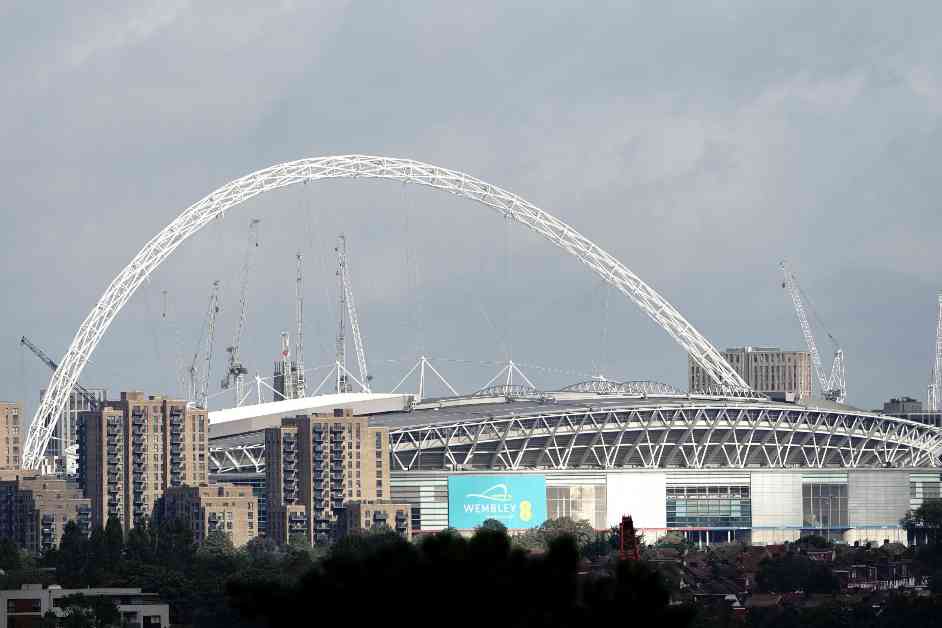Wembley Stadium, one of the most iconic venues in the world, has recently been granted approval to host eight additional major non-sporting events annually. This decision comes after plans were officially approved to increase the number of times major events can take place at the 90,000-seat stadium, marking an exciting development for both the stadium and the local community.
The event cap was initially introduced following the demolition of the original stadium and the construction of its modernized version, which limited the number of major sporting events that could be held at the venue. However, with the recent approval, Wembley Stadium will now have the opportunity to host a wider variety of events throughout the year, further solidifying its status as a premier entertainment destination.
Unlimited additional events have been permitted, as long as the number of spectators does not exceed 51,000. This flexibility allows for a diverse range of events to be hosted at the stadium, catering to different audience sizes and interests. With this new approval, the national stadium, which celebrated its 100th anniversary this year, will now be able to host up to 54 non-sporting events each year, compared to the previous limit of 46.
The decision to allow more events at Wembley Stadium was made after a thorough review by the Brent Council planning committee, demonstrating a commitment to enhancing the cultural and economic impact of the venue. Councillor Shama Tatler, cabinet member for regeneration, growth, and planning, expressed gratitude to all those who provided feedback on the stadium’s planning application, emphasizing the importance of community input in shaping the future of the iconic venue.
Wembley Stadium has long been a symbol of national pride and excellence, with a rich history that spans over a century. From hosting historic sporting events to welcoming some of the biggest names in music and entertainment, the stadium has played a significant role in shaping the cultural landscape of the UK. With the ability to now host additional events, Wembley Stadium is poised to continue its legacy as a global stage for world-class performances and gatherings.
Enhancing the Cultural Landscape
The approval to host more non-sporting events at Wembley Stadium opens up a world of possibilities for the venue and the surrounding community. In recent years, the stadium has become a sought-after destination for top artists and performers, drawing in audiences from around the world. Events like Taylor Swift’s Eras Tour, which injected an estimated £300 million into London’s economy, showcase the significant economic impact that major events at Wembley Stadium can have on the local businesses and communities.
By allowing for a greater variety of events to take place at the stadium, from music concerts to cultural festivals, Wembley Stadium can further diversify its offerings and appeal to a broader audience. This expansion not only benefits the venue itself but also contributes to the cultural vibrancy of the area, creating more opportunities for residents and visitors to experience world-class entertainment right in their backyard.
Supporting Local Businesses
The decision to increase the number of events at Wembley Stadium also has a positive ripple effect on the local economy, particularly for small businesses in the area. With more events being held at the stadium, there is an increased demand for services such as hospitality, transportation, and accommodation, providing a boost to local businesses that cater to event attendees and staff.
Restaurants, hotels, shops, and other establishments near Wembley Stadium stand to benefit from the influx of visitors who come to attend events, creating a thriving ecosystem of economic activity in the surrounding area. The increased foot traffic generated by major events at the stadium can help drive sales and revenue for businesses, supporting job creation and economic growth in the community.
Expanding Cultural Offerings
In addition to the economic benefits, the approval to host more non-sporting events at Wembley Stadium also enriches the cultural landscape of the area. By showcasing a diverse range of performances, exhibitions, and events, the stadium becomes a hub for creativity and expression, attracting artists and audiences from different backgrounds and disciplines.
From music concerts to art installations, comedy shows to food festivals, the expanded event calendar at Wembley Stadium offers something for everyone, catering to a wide range of interests and tastes. This diversity of programming not only enhances the overall entertainment value of the venue but also contributes to the cultural enrichment of the community, fostering a sense of inclusivity and engagement among residents and visitors alike.
In conclusion, the approval to host eight additional major non-sporting events annually at Wembley Stadium represents a significant milestone in the ongoing evolution of this iconic venue. By expanding its event offerings, the stadium is poised to further solidify its status as a world-class entertainment destination, attracting top talent and audiences from across the globe. This decision not only benefits the stadium itself but also supports the local economy, enhances the cultural landscape, and creates new opportunities for businesses and residents in the area. Wembley Stadium’s future looks brighter than ever, as it continues to shine on the global stage as a beacon of excellence and creativity.





















